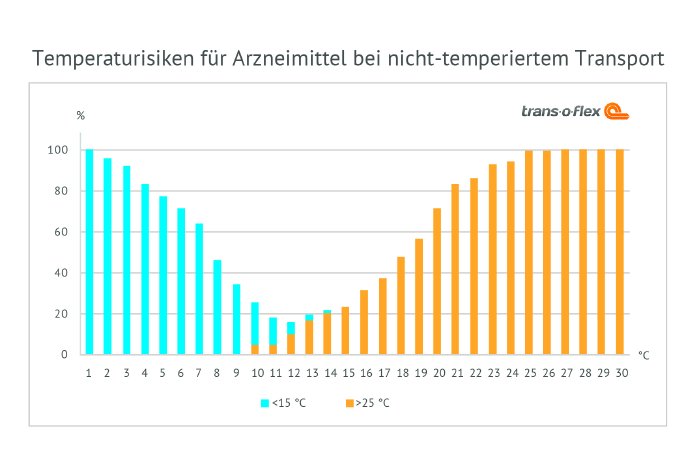- Logistics service provider trans-o-flex has measured the temperature in non-temperature-controlled delivery vehicles throughout Germany – result: no shipment is safe without temperature control
- Around 153,000 measurements taken in summer and winter
- Complimentary service: Company publishes daily updated temperature alarm
"In our experience, senders of pharmaceuticals requiring refrigeration know very well how easily their sensitive products can leave the prescribed range of 2 to 8 degrees Celsius without appropriate temperature control in the supply chain and lose their effectiveness as a result. To prevent this from happening, they employ the services of trans-o-flex subsidiary ThermoMed," Albeck continues. "But in the room temperature range of 15 to 25 degrees Celsius created for other medicines, the risk is still underestimated today. This is why we wanted to use data collected in practice to show how high the risk actually is." To this end, trans-o-flex has started extensive series of measurements in different seasons. During the measurement periods, delivery vehicles were equipped with temperature loggers at 17 trans-o-flex sites distributed across Germany. Three operational scenarios were tested at each site: an intercity route, a city route and a mixed route. The measuring instruments used (temperature loggers) recorded the temperature every 15 minutes with an accuracy of 0.5 degrees Celsius and stored it together with the time and date of the measurement. A total of 152,920 readings were taken in this way during the test periods. Each of these temperature values was related to the outside temperature that was simultaneously recorded at a measuring station of the German Weather Service that was closest to the vehicle. To reduce the evaluation effort, trans-o-flex concentrated its analysis on 40,151 readings, which were collected between 8 am and 4 pm Monday to Friday.
Temperature alarm: service quantifies risk of non-temperature-controlled deliveries
"We chose these time periods because our delivery vehicles are typically on the road by then," explains Albeck. "And on the basis of this data, our IT department has developed the Temperature Alarm website tool. This means everyone can now quantify the risk of non-temperature-controlled shipments." The Temperature Alarm service on the www.trans-o-flex.com website provides daily details of the maximum and minimum temperatures to be expected and the corresponding risk of a consignment being transported in a vehicle without temperature control at more than 25 degrees or below 15 degrees.
With an outside temperature of 23 degrees, more than 50 degrees on the load bed
"The test results lead to only one conclusion: there is no day without significant risk," Albeck notes. "The study confirmed several general findings." Firstly, the temperature in the loading space of a vehicle without temperature control follows the rise in outside temperatures during the course of the day without any significant time delay. Secondly, the loading space does not heat up slowly and in parallel with the increase in the external temperature, but the interior temperature increases in some cases exponentially to the external temperature. Even at an outside temperature of 16 degrees, 10 % of all measurements in the loading space indicated temperatures of more than 40 degrees. "This means that even at normal outside temperatures there are considerable deviations if actively temperature-controlled vehicles are not used." With an outside temperature of 23 degrees Celsius, peak temperatures of more than 50 degrees Celsius were measured in the vehicles, with an outside temperature of 30 degrees Celsius even more than 60 degrees Celsius. According to the findings of the trans-o-flex study, the colour of a vehicle is not a decisive factor in how much a vehicle heats up. "On average, the differences between white and anthracite coloured vehicles only made a difference of one or two degrees."
Further studies conducted by the pharmaceutical specialist trans-o-flex have shown that, in addition to the temperature inside the vehicles, the temperature in the warehouses also poses a high risk for the shipment of medicines. "If not actively controlled and counteracted, the temperature in conventional distribution centres rises continuously throughout the day," says Albeck. "According to our measurements, the temperature reaches its peak not at noon, but in the late afternoon, exactly when the customers' deliveries arrive." Once the heating process has started, the large mass of the buildings means that a rise in temperature, for example above the 25-degree limit of the room temperature range, cannot be prevented at short notice without active air conditioning. "Cooling has to start early, usually in the morning. And to know exactly when and how much intervention is required, continuous measurement, documentation and evaluation of temperature logs is necessary."


